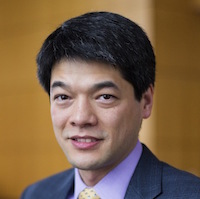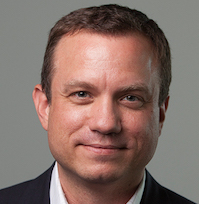Cybersecurity Task Force
Chair: Kevin Fu

Kevin Fu
University of Michigan
Kevin Fu Website
 Kevin Fu is Associate Professor of Electrical Engineering and Computer Science at the University of Michigan where he directs the Archimedes Center for Medical Device Security and the Security and Privacy Research Group. His research investigates how to achieve trustworthy computing on embedded devices with application to health care, commerce, and communication. His participation in the provocative 2008 research paper analyzing the security of a pacemaker/defibrillator led to a watershed moment in cybersecurity for medical device manufacturing and regulatory science. Prof. Fu received his Ph.D. in EECS from MIT where his doctoral research pertained to secure storage and web authentication. Fu received a Sloan Research Fellowship, NSF CAREER award, Fed100 Award, and best paper awards from various academic silos of computing. The research is featured in critical articles by the NYT, WSJ, and NPR. Kevin was named MIT Technology Review TR35 Innovator of the Year for work on medical device security. Kevin has testified in Congress on health matters and has written commissioned work for the Institute of Medicine of the National Academies. He served as a visiting scientist at the Food & Drug Administration, the Beth Israel Deaconess Medical Center of Harvard Medical School, Microsoft Research, and MIT CSAIL. Previous employers include Bellcore, Cisco Systems, HP Labs, and Holland Community Hospital. He is a member of the ACM Committee on Computers and Public Policy and the NIST Information Security and Privacy Advisory Board. He is a principal investigator of Trustworthy Health & Wellness. Prior to joining Michigan, he served on the faculty at UMass Amherst. Kevin also holds a certificate of achievement in artisanal bread making from the French Culinary Institute.
Kevin Fu is Associate Professor of Electrical Engineering and Computer Science at the University of Michigan where he directs the Archimedes Center for Medical Device Security and the Security and Privacy Research Group. His research investigates how to achieve trustworthy computing on embedded devices with application to health care, commerce, and communication. His participation in the provocative 2008 research paper analyzing the security of a pacemaker/defibrillator led to a watershed moment in cybersecurity for medical device manufacturing and regulatory science. Prof. Fu received his Ph.D. in EECS from MIT where his doctoral research pertained to secure storage and web authentication. Fu received a Sloan Research Fellowship, NSF CAREER award, Fed100 Award, and best paper awards from various academic silos of computing. The research is featured in critical articles by the NYT, WSJ, and NPR. Kevin was named MIT Technology Review TR35 Innovator of the Year for work on medical device security. Kevin has testified in Congress on health matters and has written commissioned work for the Institute of Medicine of the National Academies. He served as a visiting scientist at the Food & Drug Administration, the Beth Israel Deaconess Medical Center of Harvard Medical School, Microsoft Research, and MIT CSAIL. Previous employers include Bellcore, Cisco Systems, HP Labs, and Holland Community Hospital. He is a member of the ACM Committee on Computers and Public Policy and the NIST Information Security and Privacy Advisory Board. He is a principal investigator of Trustworthy Health & Wellness. Prior to joining Michigan, he served on the faculty at UMass Amherst. Kevin also holds a certificate of achievement in artisanal bread making from the French Culinary Institute.
Current Members
 Nadya Bliss
Nadya Bliss
Arizona State University
Nadya Bliss Website
 Dr. Nadya T. Bliss is the Director of the Global Security Initiative (GSI) at Arizona State University. GSI serves as the university-wide hub addressing emerging security challenges, including borderless threats (cyber security, health security, and resource security). These challenges are often characterized by complex interdependencies and present conflicting objectives requiring multi-disciplinary research and cross-mission collaboration. Prior to taking on the GSI role, Dr. Bliss served as the Assistant Vice President, Research Strategy in the Office of Knowledge Enterprise Development.
Dr. Nadya T. Bliss is the Director of the Global Security Initiative (GSI) at Arizona State University. GSI serves as the university-wide hub addressing emerging security challenges, including borderless threats (cyber security, health security, and resource security). These challenges are often characterized by complex interdependencies and present conflicting objectives requiring multi-disciplinary research and cross-mission collaboration. Prior to taking on the GSI role, Dr. Bliss served as the Assistant Vice President, Research Strategy in the Office of Knowledge Enterprise Development.
Dr. Bliss holds a Professor of Practice appointment (and is a member of Graduate Faculty) in the School of Computing, Informatics, and Decision Systems Engineering; Senior Sustainability Scientist appointment in the Julie Ann Wrigley Global Institute of Sustainability; and affiliate appointments in the School for Future of Innovation in Society, the Center on the Future of War (collaboration between ASU and New America), and the Simon A. Levin Mathematical, Computational and Modeling Sciences Center. Dr. Bliss is also a Senior Fellow at New America. Before joining ASU in 2012, Dr. Bliss spent 10 years at MIT Lincoln Laboratory, most recently as the Group Leader of the Computing and Analytics Group.
 Keith Marzullo
Keith Marzullo
University of Maryland
Keith Marzullo Website
 Dr. Keith Marzullo is Dean of the College of Information Studies (also known as the iSchool) at the University of Maryland, College Park. He joined the iSchool from the White House Office of Science and Technology Policy, where he directed the Networking and Information Technology Research and Development (NITRD) Program. NITRD enables interagency coordination and cooperation among the over 20 member agencies which together spend over $4B a year in NIT R&D.
Dr. Keith Marzullo is Dean of the College of Information Studies (also known as the iSchool) at the University of Maryland, College Park. He joined the iSchool from the White House Office of Science and Technology Policy, where he directed the Networking and Information Technology Research and Development (NITRD) Program. NITRD enables interagency coordination and cooperation among the over 20 member agencies which together spend over $4B a year in NIT R&D.
Dr. Marzullo has also worked at the National Science Foundation (NSF), where he served as the Division Director for the Computer and Network Systems (CNS) Division in the Computer & Information Science & Engineering (CISE) Directorate, at UC San Diego where he was the CSE Department chair, and Cornell University. Dr. Marzullo received his Ph.D. in Electrical Engineering from Stanford University, where he developed the Xerox Research Internet Clock Synchronization protocol, one of the first practical fault-tolerant protocols for keeping widely-distributed clocks synchronized with each other. His research interests are in distributed computing, fault-tolerant computing, cybersecurity, and privacy.
 Greg Morrisett
Greg Morrisett
Cornell University
Greg Morrisett Website
 Greg Morrisett is the Dean of Computing and Information Sciences (CIS) at Cornell University, which houses the departments of Computer Science, Information Science, and Statistical Sciences. He received his bachelor’s degree from the University of Richmond and both his Master’s and Doctorate degrees from Carnegie Mellon University.
Greg Morrisett is the Dean of Computing and Information Sciences (CIS) at Cornell University, which houses the departments of Computer Science, Information Science, and Statistical Sciences. He received his bachelor’s degree from the University of Richmond and both his Master’s and Doctorate degrees from Carnegie Mellon University.
Professor Morrisett’s research focuses on the application of programming language technology for building secure, reliable, and high-performance software systems. A common theme is the focus on systems-level languages and tools that can help detect or prevent common vulnerabilities in software. Past examples include typed assembly language, proof-carrying code, software fault isolation, and control-flow isolation. Recently, his research focuses on building provably correct and secure software, including a focus on cryptographic schemes, machine learning, and compilers.
Morrisett is a Fellow of the ACM and has received a number of awards for his research on programming languages, type systems, and software security, including a Presidential Early Career Award for Scientists and Engineers, an IBM Faculty Fellowship, an NSF Career Award, and an Alfred P. Sloan Fellowship.
This task force operated from operated from 2017-2018 and aimed to shed light on cybersecurity research and best practices, with a focus on cyber-physical systems and the Internet of Things in an increasingly connected world. It is succeeded by the Cybersecurity and Cybercrime task force.
Internet of Things White Papers
Security and Privacy for Democracy
This video playlist comes from the Intelligent Infrastructure for Our Cities and Communities Panel at the 2017 Computing Research Symposium. Watch more presentations from the symposium here.
Moderator: Kevin Fu, University of Michigan
Panelists:
- Roger Dingledine, Tor Project – Tor: anonymity, anti-censorship, anti-surveillance
- Simson L. Garfinkel, U.S. Census Bureau – Modernizing the Disclosure Avoidance System for the 2020 Census
- Phillipa Gill, University of Massachusetts-Amherst – Improving Democracy with Network Measurement: Challenges and Opportunities
- Daniela Oliveria, University of Florida – Cyber Social Engineering: Why You Should Care and Implications for Democracy
- Dan Wallach, Rice University – Adventures in Electronic Voting Research or Security for Electronic Voting Systems
Other resources curated for this task force include:
Robust and Secure Systems
- NSF Cyber-Physical Systems Virtual Organization
- IOActive white paper “An Emerging US (and World) Threat: Cities Wide Open to Cyber-Attacks”, 2015,
- FBI Public Service Announcement about IoT and cyber-crime (Sept. 10, 2015)
Related announcements/papers/videos:
- UN ITU (International Telecommunication Union) / GSR (Global Symposium for Regulators) report entitled “GSR discussion paper: Regulation and the Internet of Things”, June 2015
- Silicon Industry Association (SIA) / Semiconductor Research Corporation (SRC) report on “Rebooting the IT Revolution: A Call to Action”, August 2015, with specific recommendations for funding areas to accelerate the Internet of Things impact
- Brian Mosley’s CRA blog post about this (9/2/2015)
- NSF/Intel IoT partnership
- McKinsey Report: “Unlocking the Potential of the Internet of Things”
- FTC report on IoT: Privacy and Security (January 2015)
- 2006 talk by Helen Gill from the National Workshop on Cyber-Physical Systems
- John Apostolopoulos (Cisco) presentation “New Networked Applications with the Internet of Things: Technology Challenges and Opportunities”
Related Activities
- Sociotechnical Cybersecurity workshop series (2016-2017)
- Extensible Distributed Systems Workshop (NSF and CCC sponsored, January 2015)
- The New Making Renaissance: Programmable Matter and Things (CCC sponsored, June 2015)
- NSF Workshop on Autonomy in CPS and Robotics (September 2015)






